Note: There is now a newer Novel Coronavirus (COVID-19) Situation Report 46.
WHO Novel Coronavirus (COVID-19) Situation Report 45
- Five new countries/territories/areas (Bosnia and Herzegovina, Gibraltar, Hungary, Slovenia, and occupied Palestinian territory) have reported cases of COVID-19 in the past 24 hours.
- In anticipation of an increase in the number of COVID-19 cases, the South-East Asia Region is preparing to roll out rapid response activities by engaging with communities, procuring personal protective equipment (PPE), and ensuring laboratories have the capacity to test for COVID-19 or ship samples to global referral laboratories. More information can be found here.
- The WHO Director-General emphasized the importance of implementing a comprehensive approach to mitigate the impact of COVID-19. Educating the population, expanding surveillance, caring for patients, and strengthening preparedness systems are key to interrupting transmission. The WHO Director-General’s remarks can be found here.
- WHO’s initiative called the WHO Network for Information in Epidemics (EPI-WIN) leverages all communications platforms to amplify evidence-based information. EPI-WIN has identified trusted sources and engaged with these “trust chains.” More information can be found in the Subject in Focus.
Risk Assessment
China: Very High
Regional Level: Very High
Global Level: Very High
Coronavirus Situation in Numbers
Globally
- 95333 confirmed cases (2241 new)
China
- 80565 confirmed cases (143 new)
- 3015 deaths (31 new)
Outside of China
- 14768 confirmed cases (2098 new)
- 85 countries/territories (5 new)
- 267 deaths (53 new)
Situation In Focus: Infodemics
Infodemics are an excessive amount of information about a problem, which makes it difficult to identify a solution. Infodemics can spread misinformation, disinformation, and rumors during a health emergency. Infodemics can hamper an effective public health response and create confusion and distrust among people. To manage infodemics, WHO has developed an innovative communication initiative called the WHO Network for Information in Epidemics (EPI-WIN).
During emergencies demand for information is high, there are often many unknowns and people will seek information from sources and individuals and entities they trust. WHO, through EPI-WIN, has identified such trusted sources and engaged them not only as amplifiers of accurate, timely information, but also as advisers on the kind of information that their constituents need and urgently want to see.
Information exchange takes place through regular engagement calls with these “trust chains.” EPI–WIN leverages all communications platforms available to it and partners with these trusted channels to amplify evidence-based information tailored to different audiences, answering pertinent questions as the event unfolds and linking them to additional response assets.
A “trust chain” with employers and employees – the world of work
Such a “trust chain” has been established around the world of work. Workers spend approximately one-third of their adult lives at work. Because of this, employers and businesses can serve as amplifiers of trusted information about COVID-19 for employees. Employers in both private and public sectors are asking about how to protect their staff, contractors, and customers from COVID-19. Employees associations and trade unions are also seeking information on how WHO policies, guidance, and recommendations can be implemented in their workplace settings.
Working with the World Economic Forum, EPI–WIN has established networks with the key business sectors and public enterprises likely to be impacted by COVID-19 and future epidemics. These have been grouped into networks of Healthcare & Health Workers, Travel & Tourism, Food & Agriculture and International Mass Gatherings. Within each network, there are multi-national enterprises, professional associations, and UN specialized bodies representing sectors that employ tens of millions of people and account for many billions of dollars in economic activity.
EPI-WIN is also working with WHO’s Department of Occupational Safety and Health and their counterpart; global trade unions through the International Labor Organization (ILO)’s Bureau of Workers Activities (ACTRAV)and the International Trade Union Council (ITUC) which brings together affiliated trade union bodies that represent 210 million workers in 163 countries.
The engagement with trade unions has allowed many concerns to be raised around issues that could impact upon the effectiveness of public health policies and interventions aimed at containing the COVID–19 epidemic. These include issues such as infection prevention and rights of public–facing workers in health, social care, and retail sectors; safe staffing levels when sickness absences may lead to fewer workers facing potentially unsafe increases in workload; income protection for those isolated, self-isolating or requiring time off work because of school/transport closures; and discussions with employers on remote working and flexible working patterns. EPI-WIN also works closely with the WHO Health Workforce Department that collaborates with approximately 80 global health worker associations.
This is just one example of a “trust chain.” Others have been developed around healthcare workers, travel and tourism, faith-based organizations, large event organizers and others. Please visit the EPI-WIN website for more information and to view advice.
Countries, territories or areas with reported laboratory-confirmed COVID-19 cases and deaths, March 5, 2020
| Country/Territory/Area | Confirmed Cases |
|---|---|
| China | 80565 |
| Republic of Korea | 5766 |
| Italy | 3089 |
| Iran | 2922 |
| International (Cruise Ship in Japan) | 706 |
| Japan | 317 |
| France | 282 |
| Germany | 262 |
| Spain | 198 |
| United States of America | 129 |
| Singapore | 110 |
| United Kingdom | 89 |
| Australia | 66 |
| Kuwait | 58 |
| Norway | 56 |
| Switzerland | 56 |
| Malaysia | 50 |
| Bahrain | 49 |
| Thailand | 47 |
| Netherlands | 38 |
| Austria | 37 |
| Iraq | 36 |
| Sweden | 35 |
| Canada | 30 |
| India | 29 |
| United Arab Emirates | 27 |
| Iceland | 26 |
| Belgium | 23 |
| San Marino | 16 |
| Vietnam | 16 |
| Israel | 15 |
| Oman | 15 |
| Lebanon | 13 |
| Algeria | 12 |
| Denmark | 10 |
| Croatia | 9 |
| Greece | 9 |
| Qatar | 8 |
| Ecuador | 7 |
| Finland | 7 |
| Portugal | 7 |
| Belarus | 6 |
| Czechia | 5 |
| Mexico | 5 |
| Pakistan | 5 |
| Palestinian Territory | 4 |
| Romania | 4 |
| Senegal | 4 |
| Azerbaijan | 3 |
| Brazil | 3 |
| Georgia | 3 |
| Philippines | 3 |
| Russian Federation | 3 |
| Bosnia and Herzegovina | 2 |
| Egypt | 2 |
| Estonia | 2 |
| Hungary | 2 |
| Indonesia | 2 |
| Ireland | 2 |
| Morocco | 2 |
| New Zealand | 2 |
| Saudi Arabia | 2 |
| Afghanistan | 1 |
| Andorra | 1 |
| Armenia | 1 |
| Argentina | 1 |
| Cambodia | 1 |
| Chile | 1 |
| Dominican Republic | 1 |
| Gibraltar | 1 |
| Jordan | 1 |
| Latvia | 1 |
| Liechtenstein | 1 |
| Lithuania | 1 |
| Luxembourg | 1 |
| Monaco | 1 |
| Nepal | 1 |
| Nigeria | 1 |
| North Macedonia | 1 |
| Poland | 1 |
| Slovenia | 1 |
| Sri Lanka | 1 |
| Tunisia | 1 |
| Ukraine | 1 |
| Total | 95333 |
Recommendations and Advice for the Public
If you are not in an area where COVID-19 is spreading, or if you have not traveled from one of those areas or have not been in close contact with someone who has and is feeling unwell, your chances of getting it are currently low. However, it’s understandable that you may feel stressed and anxious about the situation. It’s a good idea to get the facts to help you accurately determine your risks so that you can take reasonable precautions.
Your healthcare provider, your national public health authority and your employer are all potential sources of accurate information on COVID-19 and whether it is in your area. It is important to be informed of the situation where you live and take appropriate measures to protect yourself.
If you are in an area where there is an outbreak of COVID-19 you need to take the risk of infection seriously. Follow the advice issued by national and local health authorities. Although for most people COVID-19 causes only mild illness, it can make some people very ill. More rarely, the disease can be fatal. Older people, and those with pre-existing medical conditions (such as high blood pressure, heart problems or diabetes) appear to be more vulnerable.

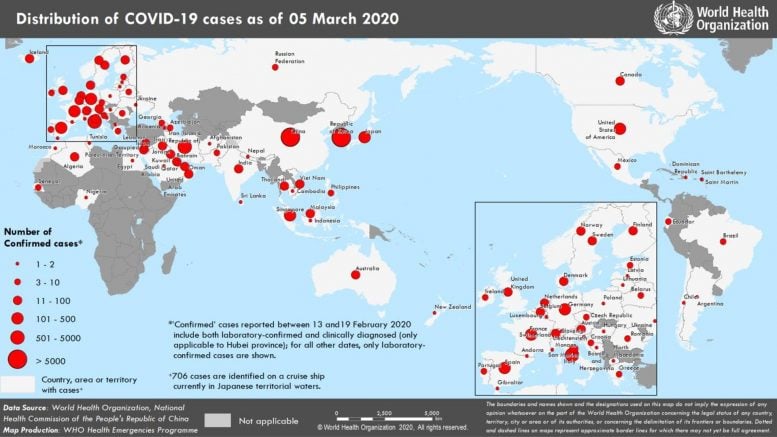
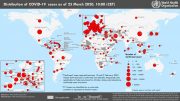
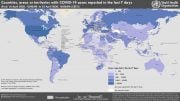
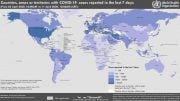
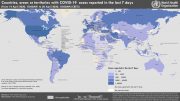
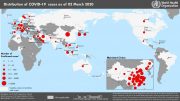
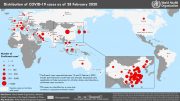
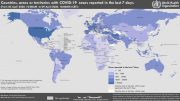
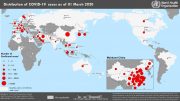
Be the first to comment on "Coronavirus Now in 86 Countries, Spreading to 5 New Countries Overnight, Over 95,000 Infected"